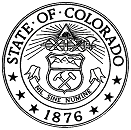![]() The information on this page is archived and provided for reference purposes only. It may be outdated or no longer maintained.
The information on this page is archived and provided for reference purposes only. It may be outdated or no longer maintained.
Go Code Colorado's Business Opportunity Challenge Announces 2020 Winners
10 Teams Awarded $10,000 in the Business Intelligence Center's NEW Challenge
Denver, December 17, 2020 – Go Code Colorado, an initiative of the Secretary of State's Business Intelligence Center (BIC), is a public data competition that now features two challenges that task teams with using data to turn Business Opportunities into Business Solutions. Since 2014, hundreds of developers, designers, business and marketing professionals, analysts, entrepreneurs, and other big thinkers have participated. The first of these new events, the Business Opportunities Challenge, has just been completed, and the winners for 2020 are: Courtney Capper, Mladen Gajic (with three submissions), Pietro Giacomin, Steve Malers (with two submissions), Janina Pohorecki, Ed Vigil, and Phillip Perrin team captain for Mile High Data Viz.
A total of 16 teams from across Colorado competed in the 2020 Business Opportunity Challenge. The winning teams pitched their business opportunities for utilization in various fields such as education, water management, and workforce relocation.
In the Business Opportunities Challenge, teams competed by submitting proposals for utilizing public data in ways that could help Colorado businesses and non-profits address their pressing issues. A panel of industry judges reviewed each submission, and the top ten ideas received $1,000 each.
“Go Code Colorado uniquely brings together civil engagement and entrepreneurial innovation. Year after year I am amazed by the creative energy the program cultivates through its unique and well-organized platform,” said James Capps, City Director, Denver House of Genius and mentor for Go Code Colorado since 2014. “Mentoring provides me a unique opportunity to step outside my technology echo chamber to understand how problems look through someone else’s eyes, giving me new perspectives and fresh ideas. I certainly gain as much as I give.”
Judges chose the ten winners for the first of these two challenges by considering if the team's submission is original, impactful to Colorado businesses, uses public data, and was a clear, concise, and engaging submission overall.
"I participated in this year's Go Code Challenge to see if I could recapture a winning spirit from the 2019 Go Code competition. I noticed the public data available this year was enhanced tremendously. It was nice to talk to old friends from the past and I like the new challenge format," said Ed Vigil, a winner in the new Business Opportunity Challenge and a 2019 Go Code Colorado winner.
Next up for Go Code Colorado is the Business Solutions Challenge, with registration opening today. This challenge (similar to historical Go Code Colorado) is about developing solutions that address key Colorado business issues. In this challenge, teams compete to integrate Colorado's public data into tools and analytics useful for Colorado's business decision-makers.
Any team competing in the Business Solutions Challenge may leverage the proposals published as part of the Business Opportunities Challenge to develop their solution or they may submit an original idea. Similar to the opportunities challenge, competitors have a chance to take home a cash prize.
Teams in both challenges are tasked with using public data to help businesses (for-profit or not-for-profit) improve their companies and communities.
More details on the ten 2020 Go Code Colorado Business Opportunity Challenge winners and their ideas:
Courtney Capper
An app or website that allows teachers to share and rate lesson plans, which can be used as a secondary measure of performance by administrators.
Mladen Gajic
An analysis tool that measures the impacts of plastic pollution policies on societal equity.
A sustainability dashboard for restaurants designed to help restaurant owners and managers implement and market environmentally sustainable measures in a cost-effective manner.
A foodservice packaging trends and targeted sales tool that will provide detailed market trends for restaurant packaging which can be broken out by restaurant type, location, materials, and much more. This information, along with a targeted sales tool, allows a decision-maker to identify specific restaurants based on their existing product usage and target them with relevant information to increase sales.
Pietro Giacomin
An open-source data dashboard for nonprofits, educational institutions, and philanthropic causes to create or enhance programs in order to address the divide in education for lower socio-economic groups.
Steve Malers
A tool that enhances the Open Water Foundation’s InfoMapper software and Poudre Basin Information website to improve access to integrated instream flow data for improved water management.
Also enhancing the Open Water Foundation’s open-source GeoProcessor and InfoMapper software as well as the Poudre Basin Information Website to create and provide public access to a statewide map layer of water supplier service area boundaries.
Janina Pohorecki
A project that takes COVID-19 infection-rate data at the county level and uses epidemiological models to serve up real-time and near-future projected needs that the food delivery sector can fill.
Ed Vigil
The SecuriDad dashboard risk assessment tool would take crime data and render it on an interactive web map to enable viewing location-specific risk trends for the security industry.
Phillip Perrin/Mile High Data Viz
An idea for businesses to identify gaps in childcare and provide resources that address childcare deserts.
For more information or to get involved in the upcoming Business Solutions Challenge, please visit www.gocode.colorado.gov.




 Menu
Menu  Search
Search 
